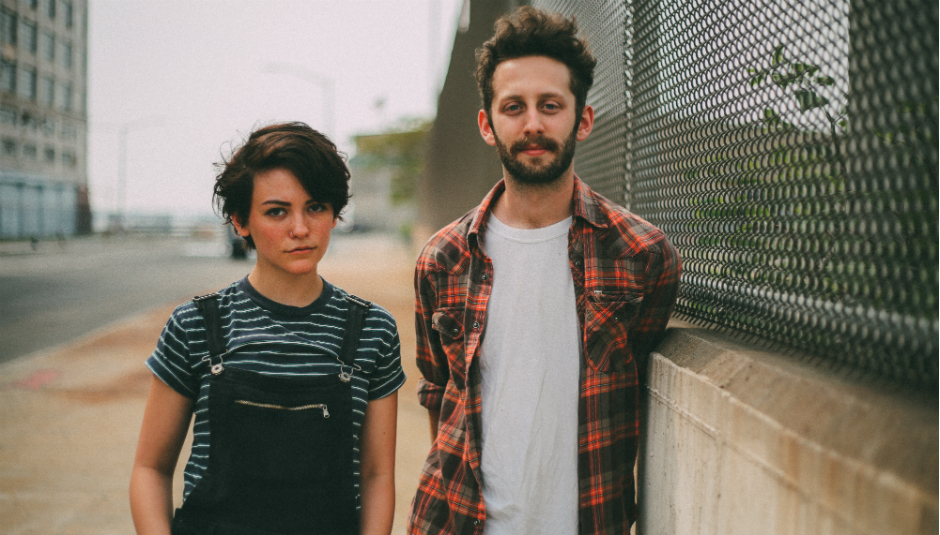On the perfectly-titled Swear I’m Good At This, the debut album they released this year, the gorgeous, breezy collegecore of Diet Cig blossomed into a beautifully nuanced, fiercely emotional and still humorous expression of youth in all its complexity. Drowned In Sound had such a lovely chat to them about self-doubt, feminism, and radical softness that if they weren’t your favourite new band already, they will be now.
DiS: The sound of your music has sort of gotten heavier as the subject matter has too. Was that a deliberate choice?
Alex Luciano: I don’t know if that was super deliberate as much as just the natural progression of our writing. I definitely think when writing this record I wanted it to touch on certain topics that were a lot “heavier” than just the stuff we were singing about before. And I think we really wanted to use my own experiences as a lens to look at the theme of feeling your feelings, and how it’s ok to be really emotional, especially as a woman. It was kind of a natural progression of songwriting because in the past year or so I’ve come into myself as who I think I am, and this long process of self-discovery and self-confidence, in myself and in my feelings. And that kinda translates to the new songs.
Yeah that makes sense. They seem to reflect on the sort of punkness of having feelings a lot of the time. I love the defiantly emotional lines like “I’ll probably cry when we kiss”.
Yeah, well I think punk has always been very emotional, like emo obviously was a feelings-y thing, and I think it’s radical when women are vulnerable with their feelings in an empowering way. Cos I feel like women are made to feel bad about those feelings a lot of the time. They’re told that there are only certain feelings that are ok to feel, when all my feelings are valid.
I love your lyrical connections between the everyday sexism stuff and the systematic invalidation of women’s feelings. So it feels super punk and radical to be so vulnerable, to treat your feelings like they matter. I love the stuff about the imposter syndrome too, like your line about “Can you tell that my shoes are too big on my feet.”
I think I’ve constantly been kind of...I don’t wanna say faking it to make it, but on the inside, I feel like I am sort of faking it to myself until I’m confident enough to feel like I’m doing things right. And I think that kind of feeling comes through a lot on the record as well. Especially as a band. Like, “Oh my god, how do I do this?”. And I think that’s what I mean in the album title too, me telling myself “I swear I’m good at this. I can do this” Even when I have days when I feel like I’m in way over my head. It’s kind of lying to yourself until you’re confident enough to really take it and be like, “I got this”.
I really related to that title. I loved the specificities in the details too, like the thing of buying things in the supermarket that you think your mum would buy.
I like relating lots of smaller unrelated things to bigger feelings I guess. So I notice little observations that I make and I’m like, I don’t know why this is making me feel so emotional right now. A lot of the songs, like 'Apricots', it’s me looking at these weird little observations that I have that make me emotional, for some reason, to try put them out there in a way that might make other people feel emotional too. It might resonate with them, as something that they feel as well.
I think your choices of specificities always really nail that, so that feeling of “Hey, on the off chance you’ve noticed yourself doing this too” feels really poignant.
Totally. Cos a lot of the things I’ve said, I think everyone feels like that about these little things, the observations I make aren’t ever these big meaningful things, they’re all just like everyday life stuff. And some of it was kinda fun writing, to be able to take those emotions that those little things made me feel and make a song that resonated with myself as well as others.
I really liked the observation in 'Tummy Ache' “It’s hard to be a punk while wearing a skirt”, both going back to self-doubt, how it feels like everyone’s constantly like “What are you doing here?”, and also in that loads of aspects of the music world simply aren’t built for women or femininity, and you have to constantly navigate it while you swear to everyone that you do belong there.
I think as a woman in the music industry, you kind of have this... women are made to prove themselves, to prove that they belong in a way that men often aren’t, and it’s really frustrating. Why do I have to show you that I’m “punk enough”, or “cool enough”, or “rock and roll enough”? I’d say when we started this band, we were in a male-driven scene, and I really got the feeling that I had to prove that I belong, prove that I was punk enough. I really resented that scene for a lot of time, and as our band has grown, I’ve felt so much more comfortable with my femininity, and reassured by these incredible people who are listening and having our backs, and going, "Oh, it is punk to be feminine. It’s punk to care, it’s punk to listen to each other’s feelings and make space for people, and have each other’s back. Your band has created this incredible thing in music for myself." I think a lot of other people feel like, "No, you don’t have to prove yourself to any of us. We believe in you." It’s really cool that they believe in us, and this thing we’ve carved out. it’s been really empowering for me, and also for the people who’re a part of it.
I love that idea of “It is punk to be feminine” and “it is punk to have feelings”. And you’ve mentioned elsewhere the idea of radical softness - I love how that’s reflected in your music. Would you say that movement’s a big part of your life?
Yeah, I think radical softness, and all the folk creating art and creating spaces for it, is a really incredible movement. It’s really inspiring to both myself and others, and we’re really excited to be a part of this idea, that you can be soft, you can be quiet, and empathetic, and that’s just as powerful as moshing and screaming and saying “fuck you”. It’s very poignant to be soft, and empathetic, and feminine; it’s all so radical to be an outwardly femme person. So we’re really excited to be making our art at a time when there are so many other inspiring artists and voices. It’s like building a community where we have each other’s backs. We can show solidarity with each other, and defend people. And it just feels good that people out there get what we’re doing, and will have our backs too. That’s the ultimate punk feeling, that sense of community.
I liked the line “You should love yourself but don’t be too proud” - I know even within a lot of purportedly body positive, pro self-love communities, it can be really alienating, a lot of people saying one thing and meaning another, so it was so validating to hear. Even there we have to work at it being good!
There’s work to be done everywhere! I’ve realised that a lot. The band was part of this community that’s putting in that work, and it’s ok, we’re doing good things that we’re proud of, but there’s always more work to be done, there’s always time for self-examination. And it’s so important, as a band doing activism, to take a step back and ask, "How can I listen to others and find out how I can be a better ally, or a better friend, or a better voice? Or is it time to pass the mic and let someone else speak?" So I think that it’s super, super important to be excited about talking about feminism, and trying to defend people, and actually in the past year I’ve realised that we’re always learning, we’re always trying to take a step forward, so that there’s more understanding for everyone.
It can be really hard because learning curves don’t really end - obviously, that’s how they work - and it can almost feel a bit tiring when there’s always more work to be done. Every time you think “Oh I’m enlightened now, I’m liberated now”, it’s like “Oh there’s this whole other dimension to this thing that I’d got figured out”.
It’s true, constantly being like "Oh crap, ok, now there’s always another level to everything" and I think it’s amazing, and also a bit exhausting, and I’m really grateful to the community for very kindly trying to support each other as we figure it all out. It's also really important to take time for yourself, and to utilise self-care, and to recognise when you can and can’t be in a particular situation, and to listen to yourself.
The idea of self-care’s really important. But again, it’s an idea that can get kinda corrupted by the people who claim to be its biggest supporters, until it ends up being another movement for thin, pretty white people. And it can be a bit "OK, of course we do have to care for ourselves, but what does it mean if you can’t afford to treat yourself, or you don’t have a supportive family?" etc.
Really, there’s a lot to think about for sure, but I think the movement right now is becoming increasingly intersectional, and I think people are taking a step back and thinking "OK, I really need to care for myself first, but some people can’t take care of themselves first, so how can we care for each other?" And just thinking about how do you actually protect others?
It’s like that Angela Davis quote, “We must strive to lift as we climb”. So do you do a lot of stuff to make your gigs more accessible and friendly for everyone?
We try really hard to make our shows safer spaces. I usually make an announcement at the beginning to ask people not to mosh, and to act with consent in mind at our shows, and we want everyone to have a safe, fun show experience. Also, we try really hard to play venues that are all-ages and accessible, because firstly when I see 21-up shows, it really bums me out that kids can’t go to these shows just because there’s alcohol there or whatever -I think that’s really fucked up - and also there are some really great all-ages venues, so we’ll always try to play there. We always try to create a sense of positivity at our shows, and factor in how people feel and make them feel like they can come forward if there’s an issue. We want people to be able to say "Hey, something’s wrong." We want our shows to be safe places to do that.
That sounds like heaven, honestly. It’d be amazing if people respected your consent regarding moshing!
Sometimes people really don’t respect that and I’ve had to stop in the middle of a song and say "Look, you guys need to stop it right now", to address people who were being rowdy and disrespectful to other audience members. Cos it’s one thing to say, "Oh this is a safe space" and another thing, I’ve realised, to actually enforce that. And it’s a hard thing to do to stop in the middle of a song and say “Stop it!" but I’ve realised it makes shows so much better, and we’ve been really inspired by other bands who have that policy of respecting others in the audience. They’ve stopped in the middle of songs before too, to make sure people were safe. And I think it’s a really cool thing that’s happening now, in music and at shows, and it’s obviously not perfect; they're not the utopias that we wish they were, but I think we’re trying really hard to make it clear that that’s the kind of space we’re trying to create in our shows.
Diet Cig's Swear I'm Good At This is out now via Frenchkiss Records. For more information about the band, including upcoming tour dates, please click here.
Photo credit: Andrew Piccone






















